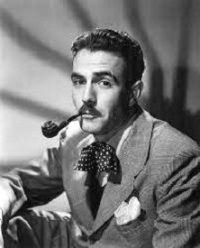
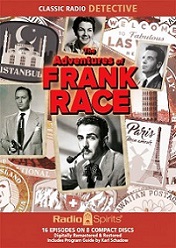 “Before the war, Frank Race worked as an attorney,
“Before the war, Frank Race worked as an attorney,
but he traded his law books for the cloak-and-dagger of the OSS.
When the war was over, his former life was over, too . . .
adventure became his business! “
The Adventures of Frank Race (1949-50) aired “The Adventure of the Vanishing President” on June 5, 1949, as the 6th of its 43 episodes.
Original air dates for this program are impossible to pin down due to the fact that it was not sold to one of the four major national radio networks who would air the shows at a set day and time nationwide, but was syndicated to individual stations across the country who would broadcast episodes at whatever dates suited their local programming.
The italicized opening at the top of this page is the host’s introduction to each episode. The premise of a private investigator with a government background such as the O.S.S. (Office of Strategic Services, forerunner to our C.I. A.) was not new. Radio had a number of programs prior to Frank Race when espionage was still in the minds of the public following World War II, among them Secret Agent K-7 (1939), The Man Called X (1944), Dangerous Assignment (debuting in 1949), and also debuting in 1949 was Richard Diamond, Private Detective who had a background which included the O.S.S.. The Adventures of Frank Race has been characterized as a combination of Johnny Dollar and James Bond. Johnny Dollar in that Race also investigates for an insurance firm, and James Bond due to the women, beautiful and honest and beautiful and not so trustworthy, with whom he has encounters. While Race obviously has “cases” due to his work for the insurance company, they are designed more as world-traveling adventures, thus the title of the show.
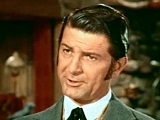 Tom Collins (1913-1973, photo top right) starred as Frank Race for the show’s first 22 episodes. Collins was well known to radio fans as the voice of Chandu in the 1948 run of Chandu the Magician. Beginning with episode 23, Collins would pass the torch to versatile and talented radio actor Paul Dubov (1918-1979, photo at right), and nary a beat was missed. From 1938-1977 Dubov appeared in many film and/or TV shows, a few among them being Day the World Ended (1955), The She Creature (1956), Voodoo Woman (1957), and The Underwater City (1962) for film, and Wanted, Dead or Alive (1960) and Bat Masterson (1961) for
Tom Collins (1913-1973, photo top right) starred as Frank Race for the show’s first 22 episodes. Collins was well known to radio fans as the voice of Chandu in the 1948 run of Chandu the Magician. Beginning with episode 23, Collins would pass the torch to versatile and talented radio actor Paul Dubov (1918-1979, photo at right), and nary a beat was missed. From 1938-1977 Dubov appeared in many film and/or TV shows, a few among them being Day the World Ended (1955), The She Creature (1956), Voodoo Woman (1957), and The Underwater City (1962) for film, and Wanted, Dead or Alive (1960) and Bat Masterson (1961) for 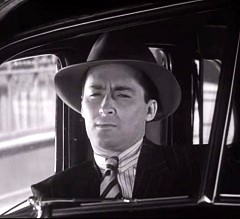 TV. Though the title role was split evenly between Collins and Dubov during the show’s run, Race’s sometimes valet/cab driver/associate and “sidekick” if you will, was Marc Donovan, played perfectly throughout all 43 episodes by Tony Barrett (1916-1974, photo at left as the character Melody Fiske, a piano playing thug in the 1947 film Dick Tracy Meets Gruesome, featuring Boris Karloff), another of radio and TV’s most versatile actors, writers, and even producers. Two of his several TV credits include being one of the writers for the popular detective program Peter Gunn (1958) and one of the primary developers of The Mod Squad (1968). A few of the supporting actors appearing in episodes during the show’s run were many of radio’s finest, including Gerald Mohr, Frank Lovejoy, Lurene Tuttle, Virginia Gregg, and Parley Bear.
TV. Though the title role was split evenly between Collins and Dubov during the show’s run, Race’s sometimes valet/cab driver/associate and “sidekick” if you will, was Marc Donovan, played perfectly throughout all 43 episodes by Tony Barrett (1916-1974, photo at left as the character Melody Fiske, a piano playing thug in the 1947 film Dick Tracy Meets Gruesome, featuring Boris Karloff), another of radio and TV’s most versatile actors, writers, and even producers. Two of his several TV credits include being one of the writers for the popular detective program Peter Gunn (1958) and one of the primary developers of The Mod Squad (1968). A few of the supporting actors appearing in episodes during the show’s run were many of radio’s finest, including Gerald Mohr, Frank Lovejoy, Lurene Tuttle, Virginia Gregg, and Parley Bear.
As to this episode, “The Adventure of the Vanishing President,” Race is given the assignment of finding out how and why ships have been disappearing, and goes undercover aboard a ship headed for South America. He soon finds himself embroiled in international intrigue of the most dangerous variety, but to reveal anything more specific would be a disservice to the listener, denying them the pleasure of discovering how Race resolves a life-threatening situation involving the titular vanishing President.
Play Time: 27:00
{After listening to this Frank Race episode on a Sunday evening, the neighborhood gang was hot to trot to the corner newsstand the next morning, their first Monday of summer vacation with no school. Seeking more detective stories of derring do with the Good Guys foiling all manner of Bad Guys, the gang was in luck. G-Men Detective (1935-53) began as a popular pulp displaying the ultimate good guys, government agents foiling organized crime. But as interest waned in such exploits (partly from an overdose of the govt. vs. organized syndicates genre in films) the emphasis changed to the more generalized detective adventure (“detective” was added to the title in 1940) and ran successfully for another 8 years. Though it managed but 5 issues in 1949, the first two were bi-monthly and the final three were quarterly. Popular Detective (1934-53) was a basic, meat and potatoes detective pulp, featuring high quality material from many of the most popular writers of the day. It ran for an amazing 133 issues and was a bi-monthly in 1949. Private Detective (1937-50) debuted roughly three years after the spate of pulps with “spicy” in their titles (Spicy Detective being but one). According to one source, “Private Detective Stories was Spicy Detective with less decorative covers [ed. note: decorative meaning almost R-rated] and some, but not much, of the psychopathology left out.” It would run for all of 134 issues and only added the two comic strips in mid-1949, beginning coincidentally with the issue pictured below. Though a monthly until 1946, its schedule then became erratic until its demise, and in 1949 only 5 issues were produced.}
[Left: G-Men Detective, Summer/49 – Center: Popular Detective, 7/49 – Right: Private Detective, 6/49]
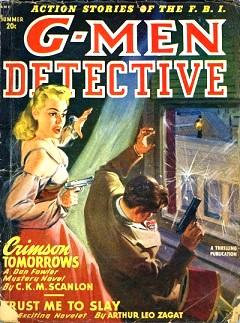
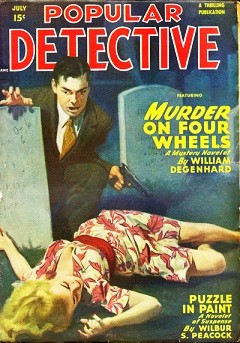
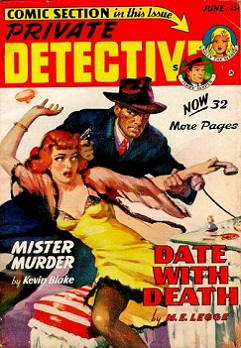
To view the entire list of weekly Old Time Radio episodes at Tangent Online, click here.